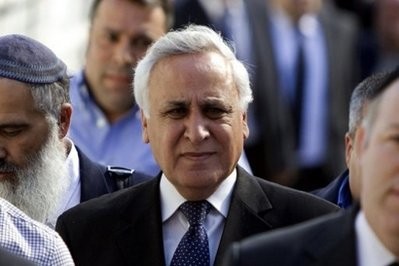JERUSALEM, March 22, 2011 (AFP) - Israel's former president Moshe Katsav, who was on Tuesday sentenced to seven years behind bars for rape, has long been hounded by unprecedented allegations of sexual assault and harassment.

Katsav was formally indicted in March 2009, more than two years after the case went public, for offences committed against his employees when he served as tourism minister and president, including rape and sexual assault.
The Iranian-born bureaucrat, who rose from impoverished origins as a child immigrant to the nation's top job, resigned in June 2007 and became a leper of the political establishment, his humiliated and loyal wife Gila in tow.
Despite strenuously professing innocence to a litany of sex and rape charges, and refusing enormous public pressure to resign for months, Katsav stepped down as part of a plea bargain that incensed women's rights groups.
However, he later decided that instead of facing trial for lesser charges he would "fight until the truth comes out" and called the deal off.
He was convicted in December of rape, sexual harassment, indecent acts and obstruction of justice following an 18-month trial which included harrowing details which portrayed him as a sexual predator who routinely harassed his female staff.
Reading out the sentence, Judge George Kara said: "The crime of rape harms and destroys a person's soul ... The defendant committed the crime and like every other person, he must bear the consequences. No man is above the law."
Katsav, who for years embodied the working class kid made good, was Israel's second consecutive president forced out by scandal, ending a previously respected career in disgrace.
"I did not have the strength for a legal battle... so I confessed to hugging and kissing out of fondness," he reportedly told the tabloid-style Maariv newspaper, explaining why he signed the controversial plea bargain.
But it will be the graphic allegations from his secretary when he was tourism minister in the late 1990s, of Katsav the rapist, his "monstrous" and "split personality" and subjecting her to "terror" that will stick in the public mind.
Katsav was replaced as head of state by Nobel peace laureate and elder statesman Shimon Peres, who had lost out to the disgraced politician for the post in a 2000 vote.
Seen as a relative outsider, an unremarkable bureaucrat with an unblemished record, the fluent Farsi speaker upset the frontrunner Peres, a former premier admired worldwide, to be sworn in for a seven-year renewable term.
A member of the rightwing Likud party, he was Israel's first conservative president -- and the first born in an Islamic country -- to take on the largely ceremonial functions, expected to rise above personal or factional interest.
One of eight children, Katsav was born in December 1945 and arrived in Israel three years after the 1948 war of independence in what were difficult early years as a young immigrant in the fledgling Jewish state.
He lived in the Kiryat Malachi tent camp for new arrivals south of Tel Aviv, and became the first local resident to attend Israel's Hebrew University.
In 1969, Kiryat Malachi residents elected the 24-year-old student as their mayor -- Israel's youngest. In 1977, he joined parliament and quickly entrenched himself in the Likud.
Studying economics and history, he took up teaching to help support his family before becoming Likud parliamentary chairman in the mid-1990s and serving as tourism minister and deputy premier in the government of Benjamin Netanyahu.
Considered a competent administrator within the hawkish Likud and as tourism and transport minister in the 1980s and 1990s, Katsav emerged a relative moderate after becoming head of state.
He offered to hold talks with Syrian President Bashar al-Assad, and insisted that the late Palestinian leader Yasser Arafat had a role to play in the peace process at a time when he was spurned by then-prime minister Ariel Sharon.
Katsav was the first head of state to visit Austria, once annexed by Adolf Hitler as part of Nazi Germany, and Croatia, where an estimated 75 percent of its 40,000 Jews were killed during the World War II Holocaust.
At the funeral of Pope John Paul II in April 2005, Katsav introduced himself to the then president of Iran, who was born in the same town of Yazd. He shook Mohammad Khatami's hand and spoke to him in Farsi.
But he also played the protocol card abroad, emphasising Israel's "right to self-defence" and warning of rising anti-Semitism.
He has been married to Gila since 1969 and has five children.
























